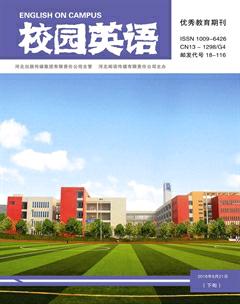Translation Methods of Chinese Landscape Poetry Referring to Leaving Blanks
LI Chen
【Abstracts】Poem and painting, being regarded as an integration, are sharing the same origin. How to make the foreign readers feel the same way with the original Chinese readers is crucial in the process of translating Chinese landscape poetry. Several English versions of Wang Weis landscape poems are analyzed, referring to the skills of Chinese painting, for instance, blank-leaving and cavalier perspective, which can provide a brand-new perspective for Chinese landscape poetry translation, and at the same time, help to retain the feelings in the original poem.
【Key words】Chinese landscape poem; Chinese painting theory; blank-leaving; cavalier perspective; Wang Wei
1. Introduction
The title of this essay shows that in this thesis, poem and paintings are closely related together. There has been a hesitation over this title. Since Lessing's Laocoon, which could be rated as the most important work of poetry theory in modern literature claims that “paintings are the art of space, while poems are the voice of time.” They are using two different medias so that pictures are better for describe the scenes and poems for narrating movement.
2. Leave Blanks
Song Baihua proposed that the pursuit to the spirit of “blank” is the embodiment of Chinese traditional art. “Blank” is also an important component of the art form of traditional Chinese painting. Wang Wei can be regarded as one of the best poet in using this skill, whose poems are always ethereal. This thesis analyzed the usage of “leaving blanks” in his poem《鸟鸣涧》:
鸟鸣涧
人闲桂花落,夜静春山空。
月出惊山鸟,时鸣春涧中。
Word “空” shows the gap and nothingness of the scene that is described in the poem above. While reading this poem, a vivid picture is presented in the readers mind. As Gao Qing explained, “Surrounded by a wound river, a city stands solitarily in the twilight. There is a shade of color above the forest, which is maybe a mountain far away, maybe not. Human voices can be heard from the boat moored beside the river, but no beings can be seen. Gaps between lines set off a scene of tranquility.” Several versions will be listed as follows to interpret the method of “leaving blanks” in translating Chinese landscape poems.
Version 1: Translated by Yang Xianyi and Gladys Yang (杨宪益、戴乃迭)
The Gully of Twittering Bird
Idly I watch the cassia petals fall,
Silent the night and empty the spring hills;
The rising moon startles the mountain birds,
Which twitter fitfully in the spring gully.
Version 2: Translated by Weng Xianliang (翁显良)
Stillness Audible
Free and at peace. Let the sweet osmanthus shed its bloom.
Night falls and the very mountains dissolve into the void.
When the moon rises and the birds are roused,
their desultory chirping only accents the deep hush of dales.
As “blanks” being the delicate part of Chinese landscape poetry, translation of it should keep the art and connotation of Leaving Blanks. In translating such a poem, modifiers of subsidiary importance are not necessary to be rendered in the target language specifically for they only play a minor role in the expression of the theme, and their function is to amplify the effect of blanks.
Two versions above are of different styles. “Empty” and “void” are respectively used in the poems above, but the word “void” has a meaning of loneliness. Since the poem here is trying to express leisure rather than vacuous, “empty” is better in this text. When it comes to “惊”, “startle” is definitely more vivid and relevant than “rouse” or “arouse”.
3. Conclusion
To introduce landscape poems to foreign readers, many translators are trying their best to give readers a good translation version. But without an adequate method, this is by no means an easy work. And its difficult to find the target text in English for some Chinese characters.
Lewis C. Day, an English scholar, expressed in his Poetic Images that an image “is a picture made out of words”. When translating Chinese poetry, the aesthetic value of it should never be forbidden, and the methods mentioned in this thesis must be based a principle that the target language texts should be understandable to readers.
References:
[1]宗白华.美学散步[M].上海:上海人民出版社,1981:148.
[2]高擎.中国画论观照下的中国山水诗歌的美学价值及其翻译[J].宿州学院学报,2010:50.
[3]Li Chen.On Culture Translation of Hong Lou Meng[J].Anhui:Overseas English.2015.
[4]Lewis,C.D.The poetic image[J].Symposium A Quarterly Journal in Modern Literatures.1947,10(1):1-24.
作者简介:李晨(1994-),女,陕西延安人,硕士研究生,主要研究方向为翻译。

